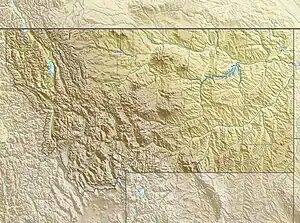Red Eagle Mountain
Red Eagle Mountain (8,881 feet (2,707 m)) is located in the Lewis Range, Glacier National Park in the U.S. state of Montana.[3] Red Eagle Mountain rises more than 4,000 ft (1,200 m) above Saint Mary Lake and is easily seen from the Going-to-the-Sun Road and the entrance to the park from the village of St. Mary, Montana as well as at Rising Sun. The mountain was named according to James Willard Schultz, "by his Indian wife in 1887, for her uncle, Red Eagle, who had saved their son's life with his prayers to the Sun".[4]
| Red Eagle Mountain | |
|---|---|
 Red Eagle Mountain below cloud from St. Mary, Montana | |
| Highest point | |
| Elevation | 8,881 ft (2,707 m)[1] |
| Prominence | 801 ft (244 m)[1] |
| Coordinates | 48°39′16″N 113°32′55″W[2] |
| Geography | |
 Red Eagle Mountain Location in Montana  Red Eagle Mountain Location in the United States | |
| Location | Glacier County, Montana, U.S. |
| Parent range | Lewis Range |
| Topo map | USGS Rising Sun, MT |
Geology
Like other mountains in Glacier National Park, the peak is composed of sedimentary rock laid down during the Precambrian to Jurassic periods. Formed in shallow seas, this sedimentary rock was initially uplifted beginning 170 million years ago when the Lewis Overthrust fault pushed an enormous slab of precambrian rocks 3 mi (4.8 km) thick, 50 miles (80 km) wide and 160 miles (260 km) long over younger rock of the cretaceous period.[5]
Climate
Based on the Köppen climate classification, the peak is located in an alpine subarctic climate zone with long, cold, snowy winters, and cool to warm summers.[6] Temperatures can drop below −10 °F with wind chill factors below −30 °F.
Gallery
References
- "Red Eagle Mountain, Montana". Peakbagger.com. Retrieved July 28, 2017.
- "Red Eagle Mountain". Geographic Names Information System. United States Geological Survey, United States Department of the Interior. Retrieved July 28, 2017.
- Rising Sun, MT (Map). TopoQwest (United States Geological Survey Maps). Retrieved July 28, 2017.
- "Historic Place Names". National Park Service. Retrieved July 28, 2017.
- Gadd, Ben (2008). "Geology of the Rocky Mountains and Columbias".
{{cite journal}}: Cite journal requires|journal=(help) - Peel, M. C.; Finlayson, B. L.; McMahon, T. A. (2007). "Updated world map of the Köppen−Geiger climate classification". Hydrol. Earth Syst. Sci. 11: 1633–1644. ISSN 1027-5606.

